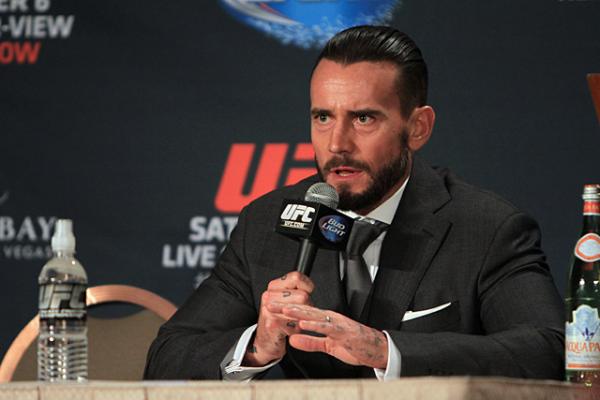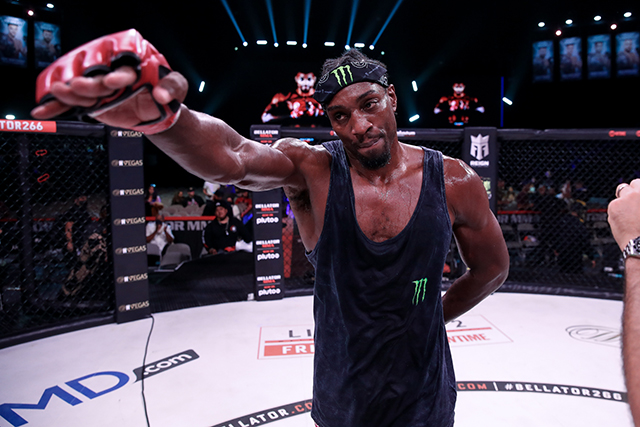Opinion: The UFC’s Shotgun Marriage to ‘CM Punk’

How
“CM Punk” fits into the UFC puzzle remains to be seen. | Photo:
Jeff Sherwood/Sherdog.com
The Ultimate Fighting Championship is banking on “CM Punk” and his Cult of Personality to bring in fans to watch its currently cold product. It needs all the star power it can get, with 45 shows a year and lots of main-event slots for television programming.
In bringing in the former World Wrestling Entertainment superstar, the UFC has rightfully opened itself to significant criticism. Part of the criticism comes from hardcore MMA fans who detest professional wrestling’s long-storied connection to the sport. If it was not for professional-wrestling star power, Pride Fighting Championships would have never become the global powerhouse promotion that captured the imagination of so many fans. If it was not for larger-than-life personalities and pro-wrestling supporters like Ken Shamrock, Dan Severn and Don Frye, the UFC’s early history would not be nearly as colorful as it turned out to be.
Advertisement
The problem the UFC has in trying to sell a “CM Punk” fight is that there is not really anything to sell to the masses other than his previous connection to the WWE. The venerable Jim Ross praised the UFC’s signing of “CM Punk” as solid business. The irony in this praise is that it goes against the principles with which Ross grew up in Mid-South Wrestling in the 1980s, when it marketed wrestlers like Dr. Death Steve Williams and Hacksaw Butch Reed based on their athletic backgrounds: All-American wrestlers, football studs, basketball and baseball talents and amateur boxers. It was easy to sell the toughness of an old-school wrestler when he had an actual athletic background in which you could believe.
The fight business is all about selling hope. The UFC has to hope
pro-wrestling fans will somehow believe that “CM Punk” -- who does
not have a decorated sporting background -- is a talented enough
person to adapt to martial arts very quickly. I am not sure where
one can develop the amateur wrestling and boxing skills needed to
survive in today’s UFC. It is also going to be a challenge for the
UFC to market and promote someone who has an admitted history of
concussion problems.
If you look at some of the past freak-show fights promoted in MMA, most of them at least featured some sort of promotion based on a mythical or theoretical sporting background: Kevin Ferguson, aka “Kimbo Slice,” as the backyard brawler, Herschel Walker as the dominant athlete from the University of Georgia, the USFL and the NFL, Bobby Lashley and Brock Lesnar as amateur wrestlers with freakish athletic ability. Even the inimitable James Toney, who was tailor-made to be picked apart by Randy Couture at UFC 118, entered the cage with his world-class boxing credentials; and the UFC drew criticism for booking Couture against Toney.
With “CM Punk,” the UFC is going to have trouble finding a sweet spot in booking the right opponent. The best opponents for marketing purposes are all experienced martial artists who could seriously inflict physical damage on him. What kind of opponent can you book against “CM Punk” in a fantasy fight that will draw the kind of attention a fight like Matt Hughes-Royce Gracie drew for UFC 60 at the Staples Center in Los Angeles?
For those who have not already done so, do yourself a favor and listen to the Sherdog Radio Network discussion between Jack Encarnacao and Jonathan Snowden on the “CM Punk” signing. Encarnacao believes that until the UFC starts making more money from conventional television than it makes on pay-per-view we will see the company take risks that a normal, run-of-the-mill traditional sport would not even dare to consider.
There is an image risk in the UFC booking “CM Punk” for a PPV fight, especially if he gets hurt badly. When you look at the modern history of professional wrestlers jumping into the MMA fray, most had some sort of previous fighting background. Not everyone turned out to be as accomplished as Kazushi Sakuraba, but plenty of wrestlers like Takashi Sugiura, Shinsuke Nakamura and even Yoshihiro Takayama managed not to embarrass themselves in MMA fights. The concern the UFC has in promoting “CM Punk” in a primetime PPV fight is that his performance could end up looking as ugly as Nobuhiko Takada’s against Rickson Gracie; or the way Yuji Nagata looked against Mirko Filipovic; or the way Kiyoshi Tamura looked against Valentijn Overeem.
The tug-of-war between promoting the past and promoting the UFC is on full display with its pursuit of “CM Punk.” Its history acknowledges and recognizes the lineage with professional wrestling star power. However, the future is all about promoting a real sport that has matured into a long-term property on Fox. The Brooks signing naturally conflicts with these two paths. One could sense this during the UFC 181 post-fight show that aired on Fox Sports 1. UFC President Dana White admitted his skepticism about whether or not “CM Punk” could actually fight, and there was no focus on the signing until about an hour into the telecast. It turns out that there were just as many fans interested in the “CM Punk” signing as there were in Anthony Pettis and Robbie Lawler winning at UFC 181.
The dilemma the UFC faces in booking “CM Punk” on PPV is that the kind of opponent that would draw the most eyeballs is also the kind of opponent that would most likely hand him a beating. If Brooks fights at middleweight, a fight with Michael Bisping is the kind of spectacle that could draw half a million PPV buys. The problem is that there would be little mystery to the outcome of such a fight. If you book “CM Punk” against a lesser-known but just-as-talented middleweight, then you get the worst of both worlds: fewer eyeballs with the same predictable outcome. That leaves the UFC with the possibility of booking Brooks against a newcomer in some sort of exhibition fight, ala “Kimbo Slice”-Ray Mercer. I do not exactly reckon this is going to move the needle.
“CM Punk” contends that getting a chance to fight for the UFC gives him the chance to scratch something off of his bucket list. For the UFC, however, the signing is an admission that its grueling and lengthy event schedule is actually hurting its ability to produce home-grown mega-stars. For every Conor McGregor or Ronda Rousey, you have hundreds of fighters the masses largely look to as interchangeable faces and names. It is a lot easier to build new stars when you are running 12 or 16 shows as opposed to 45 events each year. The UFC has boxed itself into a corner, and the “CM Punk” signing signifies why it remains vitally important for MMA to have a thriving professional wrestling industry. Since Pride raided most of the pro-wrestling star power in Japan and killed that golden goose, the industry has never recovered. The UFC has to hope the same fate does not await the WWE, which is currently in a downslide, because it needs Cults of Personalities to sell PPVs in the future.
Related Articles







